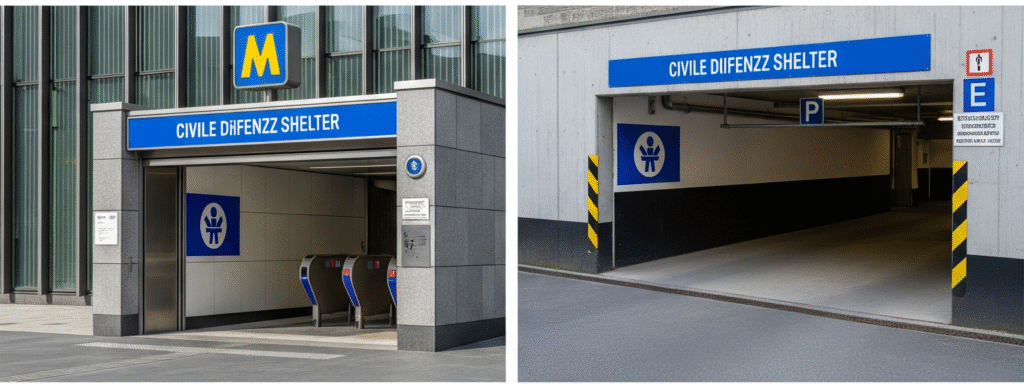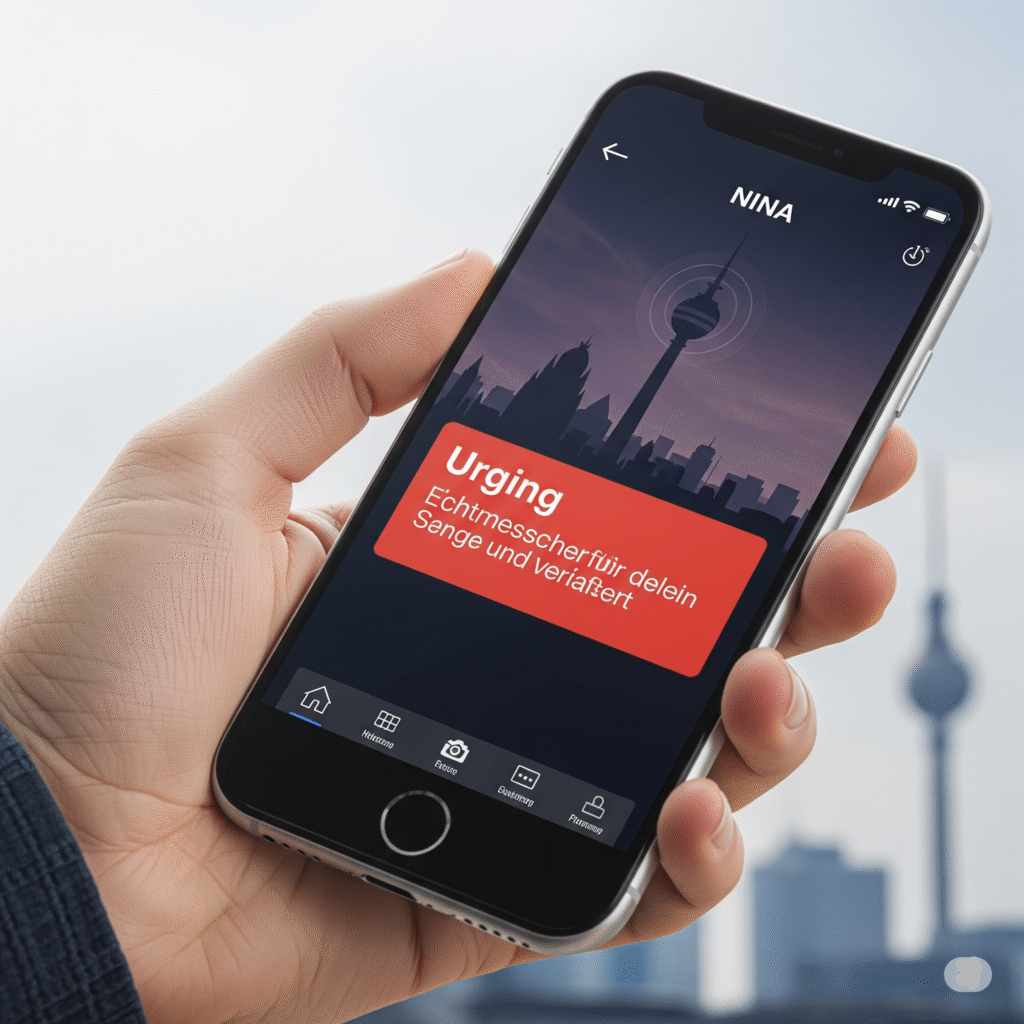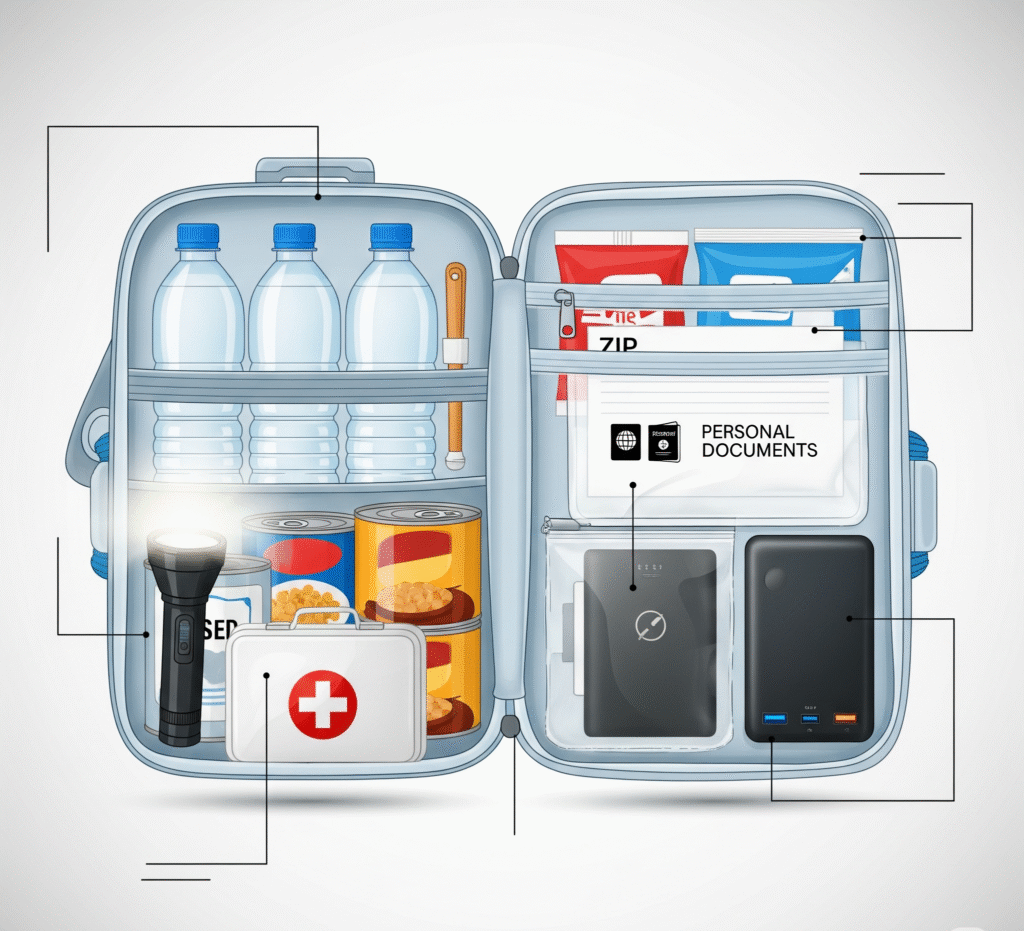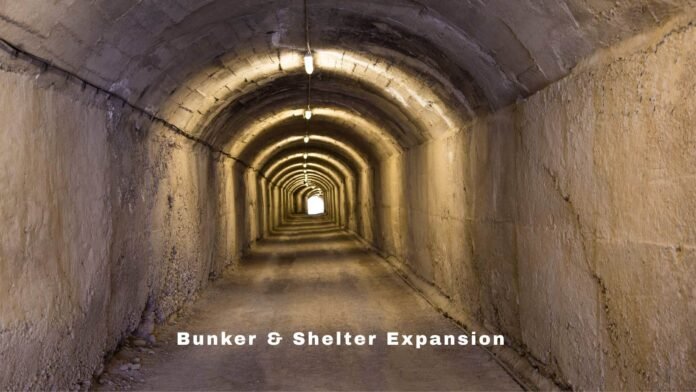
Wenn Sie ein Expat in Deutschland sind, haben Sie vielleicht schon einmal gehört, dass über Bunker und Unterstände. Das bedeutet es für Sie:
Deutschland baut seinen Zivilschutz so stark aus wie seit dem Kalten Krieg nicht mehr. Bis 2029 Regierungspläne Die Kapazität der Schutzräume soll von 480.000 auf über 1 Million Menschen verdoppelt werden. Das entspricht zwar immer noch nur etwa 1,21 Milliarden Menschen, stellt aber eine bedeutende Veränderung in der Notfallvorsorge des Landes dar. Diese Initiative ist Teil der umfassenden Strategie zur Erweiterung der Bunker- und Schutzräume.
Zu dieser Sanierung gehört die Umwandlung alter Bunker, Tiefgaragen, U-Bahn-Tunnel und sogar Keller aus der Zeit des Kalten Krieges in sichere öffentliche Schutzräume. Dies ist Teil einer umfassenderen Reaktion auf die zunehmenden globalen Spannungen, insbesondere auf die Sicherheitsbedenken in Europa nach Russlands anhaltendem Krieg in der Ukraine.
Für viele Expats ist die Idee Notbunker Das kann beunruhigend sein. Aber es geht nicht um Panik, sondern darum, vorbereitet zu sein. Ziel ist es, ein Gefühl der Sicherheit zu schaffen und sicherzustellen, dass alle, auch Neuankömmlinge, wissen, wohin sie sich im Falle einer größeren Krise wenden und was zu tun ist.
Das Leben im Ausland bringt viele Unbekannte mit sich. Dieses Update zum Zivilschutz soll die Unsicherheit verringern, nicht vergrößern.
⚡️⚡️Deutschland bereitet sich auf eine massive Erweiterung seines Netzes an Luftschutzbunkern vor
— NEXTA (@nexta_tv) 8. Juni 2025
Das Land verfügt über rund 2.000 Schutzräume aus der Zeit des Kalten Krieges, aber nur 580 davon sind noch in Betrieb – genug, um etwa 480.000 Menschen unterzubringen, was gerade einmal 0,51 Milliarden Tonnen der Bevölkerung entspricht.
Quelle: The Guardian pic.twitter.com/c6QNrj4tOS
Unterkünfte: Wo Expats Sicherheit finden
Im Zuge der Modernisierung des deutschen Zivilschutzes werden Schutzräume nicht mehr in Wäldern oder Militärgebieten versteckt, sondern mitten im Stadtleben errichtet. Man denke nur an U-Bahn-Stationen, Tiefgaragen, öffentliche Tunnel und Bunker aus der Zeit des Kalten Krieges, die wiedereröffnet und neu ausgestattet werden.
Für Expats bedeutet dies, dass viele Unterkünfte nur wenige Schritte von ihrem Alltag entfernt sind.
Der laufende Ausbau der Bunker- und Schutzräume zielt darauf ab, die Sicherheit und Bereitschaft aller Einwohner Deutschlands zu verbessern.
- Berlin: U-Bahn-Stationen, wie zum Beispiel Alexanderplatz, werden ausgestattet als Notunterkünfte dienen.
- München: Achten Sie auf S-Bahn-Knotenpunkte und Tiefgaragen in der Umgebung Marienplatz.
- Hamburg: Tunnel in Hafencity sind Teil des Upgrade-Plans.
Heute hat Deutschland 579 Betriebsbunker, verglichen mit etwa 2.000 während des Kalten Krieges. Das neue Zivilschutzprogramm wird zusätzliche Schutzräume für eine 520.000 Menschen, so dass die Gesamtzahl bis 2029 auf 1 Million steigen wird.
Um den Menschen zu helfen, diese Unterkünfte schnell zu finden, installiert die Regierung neue blau-weiße Schilder in allen Städten. Sie werden sie in der Nähe von Verkehrsknotenpunkten, Bürovierteln und Wohngebieten sehen.
Tipp: Achten Sie das nächste Mal, wenn Sie mit der U-Bahn unterwegs sind, auf diese Schilder. Sie könnten Ihre Lebensader sein.
Notfallwarnsysteme: In einer Krise informiert bleiben

Im Notfall beginnt Ruhe zu bewahren damit, informiert zu bleiben. Deutschland verfügt über ein System, das genau das ermöglicht, angefangen mit der NINA App, entwickelt vom Bundesamt für Bevölkerungsschutz und Katastrophenhilfe (BBK).
NINA liefert Echtzeitwarnungen von Unwettern bis hin zu zivilen Notfällen. Es umfasst auch Schutzkarten, Tipps zum Verhalten in einer Krise und, wichtig für Expats, Sprachunterstützung in Englisch.
So verwenden Sie es:
- Laden Sie die NINA-App aus dem Apple App Store oder von Google Play herunter.
- Aktivieren Sie Push-Benachrichtigungen, um sofort Benachrichtigungen zu erhalten.
- Erlauben Sie den Standortzugriff, um für Ihre Region relevante Updates zu erhalten.
Zusätzlich zur App aktualisierte Beschilderung In öffentlichen Räumen, insbesondere in U-Bahn-Stationen, werden jetzt universelle Symbole verwendet, um Sie zum nächsten Schutzraum oder Notausgang zu weisen.
Beruhigen: Auch wenn Ihr Deutsch nicht perfekt ist, sind diese Tools für jeden geeignet.
Mit Sicherheitsbewusstsein auf dem Vormarsch, Die Downloads der NINA-App stiegen um 25% im Jahr 2024. Wenn Sie es noch nicht getan haben, ist es jetzt an der Zeit, es auf Ihr Telefon zu laden.
Checkliste für ein 72-Stunden-Notfallset: Maßgeschneidert für Expats
Die Modernisierung der Unterkünfte ist unerlässlich, aber der Platz ist begrenzt. Deshalb Persönliche Vorbereitung ist am wichtigsten. Ein 72-Stunden-Notfallset bereit zu haben, kann den entscheidenden Unterschied machen, wenn Sie zu Hause Schutz suchen oder schnell evakuiert werden müssen.
Hier ist eine Schnellstart-Checkliste, zugeschnitten auf den Alltag von Expats:

Für Familien
- Trinkwasser: 2 L pro Person und Tag
- Haltbare Lebensmittel (z. B. Konserven, Energieriegel)
- Babybedarf (Windeln, Feuchttücher, Milchnahrung)
- Erste-Hilfe-Kasten + alle verschreibungspflichtigen Medikamente
- Gedruckte Kontaktliste (lokal + Ausland)
- Spielzeug oder Komfortartikel für Kinder
Für Mieter
- Taschenlampe mit Ersatzbatterien
- Powerbank (aufgeladen)
- Kopien von Reisepass, Visum und Mietvertrag
- Wechselkleidung + Hygieneset
- Kleine Bargeldreserve (Geldautomaten können ausgefallen sein)
Für digitale Nomaden
- Offline-Karten (Google Maps offline oder ausgedruckt)
- Laptop-Ladegerät + USB-Adapter
- Notfallkontakte in Ihrem Heimatland
- Nachfüllbare Wasserflasche
- Leichte Decke oder Schlafsack
Wo soll es aufbewahrt werden?
Bewahren Sie Ihr Set an einem leicht erreichbaren Ort auf, in der Nähe Ihres Wohnungsausgangs oder im Kofferraum Ihres Autos.
Suchen Sie nach einer druckbaren Version? [Link zur herunterladbaren Checkliste einfügen, falls verfügbar]
Nur 30% der deutschen Haushalte verfügen derzeit über ein komplettes 72-Stunden-Notfallset. Expats, die sich jetzt vorbereiten, können dazu beitragen, diese Zahl zu erhöhen und so einen Schritt voraus zu sein.
Warum Deutschland jetzt handelt: Kontext für Expats
Deutschland baut seine Bunker nicht wieder auf, weil es morgen einen Krieg erwartet. Es handelt jetzt, weil es sich vor Augen führt, was bis zum Ende des Jahrzehnts passieren könnte.
Steigende Spannungen mit Russland, Warnungen der NATO und eine zunehmend instabile globale Lage haben Berlin dazu veranlasst, seine Zivilschutzstrategie zu überdenken. NATO-Vertreter haben offen erklärt, dass Ein Konflikt innerhalb der Allianz könnte bis 2029 möglich seinDeutschland hört zu und bereitet sich vor.
Das 🇩🇪 Kabinett hat den Entwurf des Bundeshaushalts für 2025 gebilligt. Der Verteidigungshaushalt wird deutlich um rund 10 Milliarden Euro auf 62,43 Milliarden Euro steigen. Weitere 24 Milliarden Euro werden aus dem Sondervermögen für die #Bundeswehrund damit insgesamt 86 Milliarden Euro in diesem Jahr. 1/3 pic.twitter.com/3i6c2dPbfy
— Deutschland bei der NATO (@GermanyNATO) 24. Juni 2025
Als Reaktion darauf investiert die Regierung 10 Milliarden Euro in den nächsten vier Jahrenmit einem anderen 30 Milliarden Euro Langfristig geplant. Das Ziel: Schutzräume ausbauen, Infrastruktur verstärken und die Öffentlichkeit aufklären.
In ganz Europa gibt es Länder wie Finnland und die Schweiz verfügen bereits über Notunterkünfte für über 80% ihrer BevölkerungDeutschland muss aufholen, da die prognostizierte Abdeckungsrate bis 2029 lediglich 1,21 TP3T betragen wird.
Dennoch ist die Botschaft klar: Das ist keine Panikmache, sondern Vorausplanung.
Beruhigen: Dies ist ein proaktiver Schritt zum Schutz aller, auch Ihnen.
Im Jahr 2025 Die deutschen Verteidigungsausgaben erreichten 3,51 Billionen Tonnen des BIP, um das 5%-Ziel der NATO in den kommenden Jahren zu erreichen. Dieses Geld fließt sowohl in die militärische als auch in die zivile Widerstandsfähigkeit, denn moderne Bedrohungen machen nicht vor dem Schlachtfeld halt.
Proaktive Schritte für Expats: So bleiben Sie vorbereitet
Der deutsche Zivilschutzplan ist nicht nur ein Regierungsprojekt, sondern betrifft uns alle. Als Expat können Sie mit einfachen Schritten mehr Sicherheit, Informationen und Vorbereitung gewinnen.
Bleiben Sie informiert
- Folgen Sie BBK (Bundesamt für Bevölkerungsschutz) für Updates.
- Monitor Lokalnachrichten Und Expat-Foren; sie geben Warnungen oft auf Englisch weiter.
- Richten Sie Benachrichtigungen ein auf dem NINA App um Echtzeitinformationen für Ihre Region zu erhalten.
Machen Sie mit
- Suchen Vorbereitungsworkshops; viele bieten jetzt Sitzungen auf Englisch an.
- Botschaften und Konsulate bieten oft Krisenchecklisten und Sicherheitsinformationen an, die auf Ihre Nationalität zugeschnitten sind.
Planen Sie voraus
- Speichern Sie lokale und internationale Notfallkontakte auf Papier und auf Ihrem Telefon.
- Gehen Sie zu Ihrem nächstgelegenen Schutzschild oder Bahnhof mit Ihrer Familie oder Mitbewohnern. Es ist hilfreich, die Route im Voraus zu kennen.
- Üben Sie einen einfachen Evakuierungsplan für Ihr Zuhause. Schon einmal kann viel bewirken.
Aufruf zum Handeln: Verbringen Sie diese Woche 30 Minuten mit Ihrem Kit. Es lohnt sich.
Deutschlands Engagement für Sicherheit schließt auch Sie ein. Diese kleinen Schritte geben Ihnen mehr Sicherheit, denn Vorbereitung ist Macht, egal woher Sie kommen.
Fazit: Vorbereitet, nicht in Panik
Deutschland hat mit der Errichtung eines bundesweiten Netzes von Luftschutzbunkern für die Zivilbevölkerung begonnen.
— Visegrád 24 (@visegrad24) 26. November 2024
Keller öffentlicher Gebäude, Tiefgaragen und U-Bahn-Stationen erhalten eine Doppelnutzung.
Deutschland verfügte während des Kalten Krieges über ein solches Netzwerk, das jedoch 2007 abgebaut wurde. pic.twitter.com/R00FgEIK0X
Die deutsche Zivilschutzreform mag wie ein historisches Ereignis erscheinen, ist aber auf die heutige Welt zugeschnitten. Für Auswanderer ist das kein Grund zur Sorge. Es ist ein Grund, sich vorzubereiten.
Ob Sie auf Ihrem Weg zur Arbeit ein Schild mit der Aufschrift „Schutzhütte“ entdecken, die NINA-App herunterladen oder ein einfaches Notfallset packen – Sie haben die Werkzeuge, um die Kontrolle über Ihre Sicherheit zu übernehmen.
Es geht um Bereitschaft, nicht um Angst. Und in Deutschland ist man nicht allein. Das System wird so aufgebaut, dass es alle, unabhängig von ihrer Herkunft.
Häufig gestellte Fragen (FAQ)
Muss ich mich für einen Notunterkunftsplatz anmelden?
Nein. Öffentliche Notunterkünfte werden im Notfall nach dem Prinzip „Wer zuerst kommt, mahlt zuerst“ vergeben. Hinweisschilder weisen Ihnen den Weg zum nächstgelegenen Notunterkunftsort.
Was ist, wenn ich kein Deutsch spreche?
Die NINA-App und die BBK-Website bieten Unterstützung auf Englisch. Die Notrufzeichen verwenden universelle Symbole, und wichtige Warnmeldungen werden in mehreren Sprachen ausgegeben.
Woher weiß ich, wann ich in ein Tierheim gehen muss?
Sie erhalten Warnungen über die NINA-App, per Radio oder über öffentliche Durchsagen. In einigen Bereichen können auch Sirenen eingesetzt werden.
Können Touristen oder Kurzzeitbewohner auch das Regal benutzen?ters?
Ja. Der Katastrophenschutz in Deutschland umfasst alle Menschen im Land während einer Krise, egal ob Sie Einwohner, Student oder Besucher sind.
Hat dies etwas mit der Wehrpflicht oder Kriegsplanung zu tun?
Nein. Dies ist ein Zivilist Bereitschaftsplan, der sich auf Krisenreaktion und öffentliche Sicherheit konzentriert, nicht auf militärische Aktionen.
Ihre Sicherheit ist wichtig, egal woher Sie kommen. Machen Sie jetzt ein paar kleine Schritte, und Sie sind für alles gerüstet, was als Nächstes kommt.

